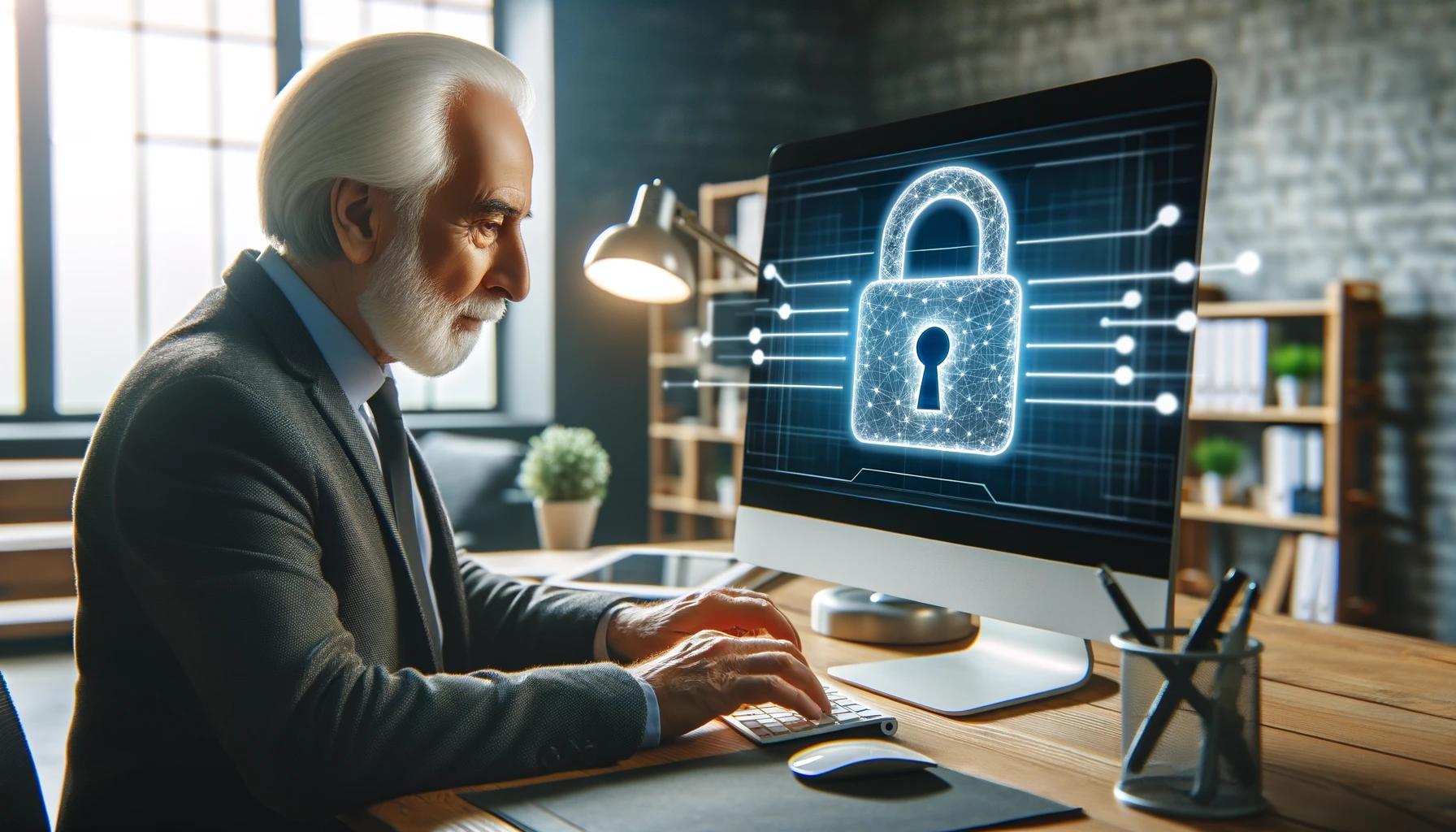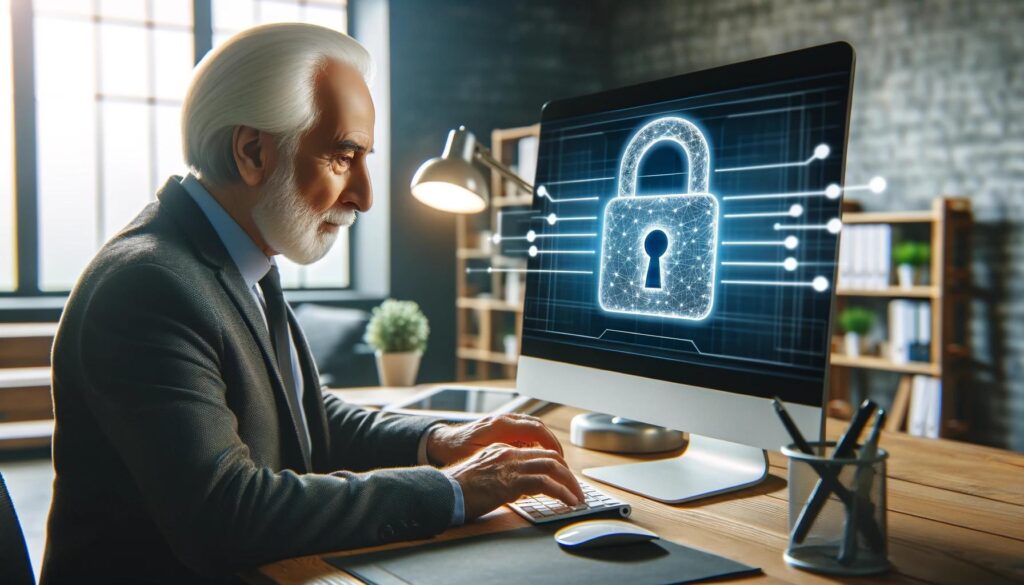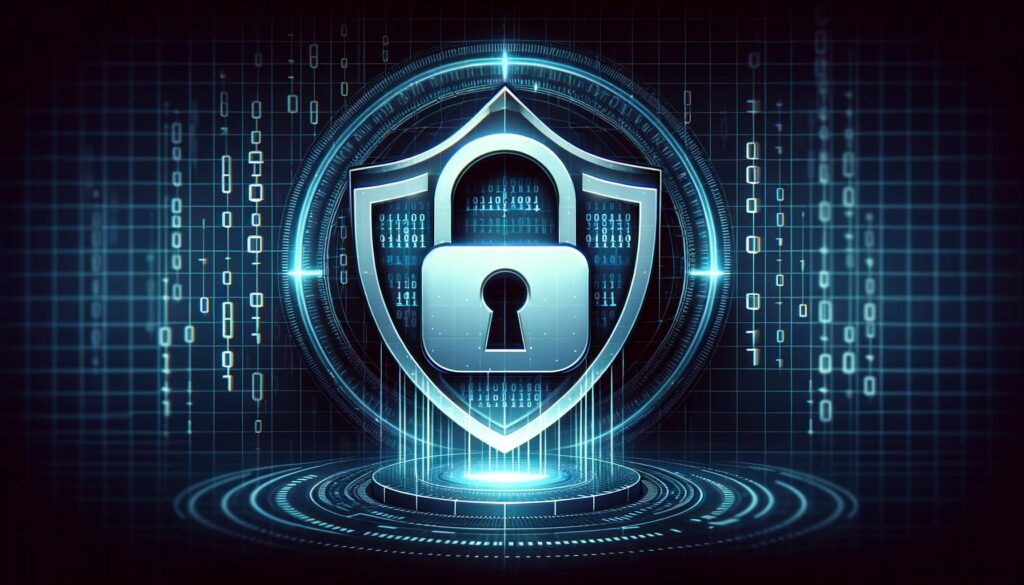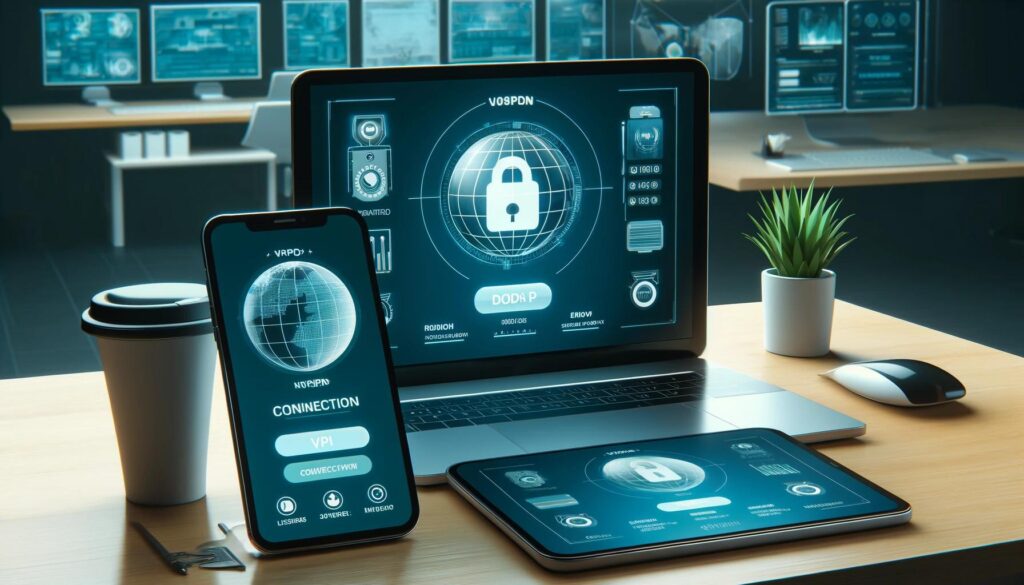
Newsletter Subscribe
Enter your email address below and subscribe to our newsletter

Ever feel like your internetThe Internet is a vast network of computers and other electronic devices connected globally, allowin... More activity is under a microscope? (Well, good, because it is!!)
But it doesn’t have to be. Using a Virtual Private Network (VPN) is like having a digital cloak of invisibility, helping you browse with less worry.
Not just for the tech-savvy, VPNs are super user-friendly, and many providers offer one-click setups.
So, let’s get you up to speed on the world of VPNs. You’ll learn what they are, the benefits of using them, the potential downsides of using them, how to choose a good one, and more.

Also, if you start reading this and decide you want a VPN but want to skip all the technical gobbly-gook, just scrollScrolling is what you do when you move up or down on a screen to see more of a webpage, email, or do... More down to the “Our Top Picks” section below. There, you’ll find the 2 VPNs we recommend (one with a great free option).
A VPN acts like a secret, protective cover for your internet connection. It wraps your data in encryptionEncryption is a way to protect sensitive data by turning it into unreadable code using complex math.... More (which hides your personal info so no one can steal it), keeping it safe from hackers and snoopers.
Especially If you’re accessing the Internet on public networks (like at a coffee shop or airport), it ensures your info remains yours.
Key benefits:
Basically, using a VPN is like having a personal bodyguard for your internet. It doesn’t wear sunglasses and a suit, but it sure does protect you!

Using a VPN has some great perks that you might not want to miss out on. Here are our top 5:
Your real IP addressAn IP Address (Internet Protocol Address) is a unique set of numbers that acts like an address for y... More and location are hidden, so nosy advertisers, websites, and even your internet service provider (ISPAn Internet Service Provider, or ISP, is the company that gives you access to the internet. You pay ... More) can’t track your every move. You’re like a ninja online!
A VPN creates a secure connection between your device and the internet. This tunnel is encrypted, protecting your passwords, credit card numbers, and other sensitive information from snoopers, especially on public Wi-FiWi-Fi, short for Wireless Fidelity, revolutionizes connectivity by enabling devices to access the in... More networks.
Traveling but want to watch your favorite TV shows from back home? If you’re out of the country, you might be blocked from doing so.
If you have a VPN, however, you don’t have to worry. A VPN lets you connect to servers in your home country, so you can stream and browse as if you were relaxing on your couch.
If your ISP slows down your internet because you binge-watch too many shows, a VPN can hide your activity. This might help prevent annoying slowdowns, giving you a smoother online experience.
If you’re in a place with strict internet rules, a VPN can help you access blocked websites and services. It’s all about maintaining your internet freedom and keeping information uncensored.
While they come in handy, VPNs aren’t perfect. Here are some of their limitations to be aware of:
False Sense of Security
Even with a VPN, you might feel like you’re inside a fortress, but keep an eye out. A VPN doesn’t block malwareMalware (short for malicious software) is a type of harmful program designed to sneak into computers... More or keep hackers away.
Blocked Streaming Services
So you think you can watch Netflix from anywhere? Think again. Some streaming services actually block VPN users. It’s like knocking on a door only to find it locked.
Blocked Websites
Websites sometimes put up a virtual “No VPNs Allowed” sign. This means you will get an error message if you try to access them through a VPN. They do this to prevent spamSpam refers to unsolicited or unwanted messages, often sent in bulk, typically via email, text messa... More or protect ad revenue.
Slower Internet Speeds
VPNs can turn your fast internet into slow motion. Encrypting your data and routing it through servers can make you feel like you’re surfing the web with a slowpoke.
Extra Data Usage
Using a VPN means using extra data. This could be a problem if you have limited data from your ISP or mobile provider. Watch out for those sneaky data caps!
Illegal in Some Countries
In some places, using a VPN could get you into hot water. Countries like China, Russia, and North Korea have banned or restricted VPNs.
Free VPNs Logging Your Data
Free VPNs might save you some cash, but they could cost you your privacy. They may log your data and sell it to advertisers, which isn’t a good deal at all. (See our recommendations below for a great free VPN that is 100% privacy-focused.)
Free VPNs and Malware
Using a free VPN could mean inviting malware to the party. Some free VPNs come with malicious ads or software. It’s like inviting a clown to a birthday party and ending up with a circus of problems. (Again, this is NOT the case with the recommendation below!)
Paid VPNs Might Not Protect from Malware
Even some paid VPNs don’t stop malware. Make sure your VPN has extra features like antivirus softwareAntivirus software is a program that protects your computer, phone, or tablet from harmful viruses a... More to keep your device safe.

Choosing a VPN can be tricky, but let’s break it down. Here are some important things to consider when choosing a VPN.
Think of security as the bouncer at a club. Would you want a bouncer who lets everyone in without checking IDs?
Nope!
Make sure your VPN has top-notch security features like strong encryption and independent audits. Free VPNs might sell your data, so stick with trusted, paid options.
No one likes a slowpoke, especially online. All VPNs slow your connection a bit, but some are better at keeping it speedy. If you’re gaming or streaming, look for VPNs known for their fast performance.
Encryption is like a secret code that only you and the recipient can understand. The best VPNs use something called AES-256 encryption. It’s super hard to crack—like trying to find a needle in a haystack that’s in another haystack.
You don’t want a VPN that requires a PhD to set up. Look for VPNs that are easy to install and use.
If it can be set up on your routerA router is a device that helps connect all your gadgets, like computers, smartphones, and smart hom... More, even better. Then, you only have to set it up once, and all your devices are protected.
If you have a lot of gadgets, choose a VPN that allows multiple connections at once. This way, you won’t have to constantly disconnect one device to connect to another.
More servers mean less congestion and better speeds. Plus, with servers in different countries, you can pretend to be surfing from anywhere in the world.
Want to watch a show only available in Japan? Easy peasy!
Different VPNs use different protocols to get the job done. Some common ones are OpenVPN (super secure), IKEv2/IPSec (great for mobile), and WireGuard (fast and efficient). A good VPN lets you choose based on your needs.
Check if the VPN keeps logs of your activity. The best ones have a no-logs policy, meaning they don’t collect or store your data. This helps keep you anonymous even to the VPN provider.
Want to shortcut the process of researching and reviewing a gazillion VPN options? We don’t blame you!
Here are our top 2 picks for VPN services we actually use ourselves and recommend. You can’t go wrong with either.
Proton is our favorite privacy-focused company, and we love their VPN solution. There’s a free version that’s great for many, along with reasonably priced paid plans with extra bells and whistles.
(Note: We are an affiliate for Proton because we personally use and believe in their products. They are genuinely one of my favorite companies in the world right now – tech or otherwise – because of their business practices, great products, and focus on privacy and security.)
PIA has been around for 10+ years and was my choice before I switched to Proton. They’re a US-based company that has 15 million users and is big on transparency, using open-source software.
How does a VPN keep my internet shenanigans undercover?
A VPN masks your IP address to hide your location. It encrypts your data, making it look like gibberish to nosy folks. This means even your ISP can’t sneak a peek at what you’re doing online.
Can I just grab a VPN off the internet like digital candy?
Yes, you can find many free and paid VPNs. Free ones might come with limitations or ads. Paid VPNs generally offer better speed and more features. But make sure to choose a reliable one to ensure your data remains safe.
Do I really need a VPN to protect my digital footprints?
If you like privacy and hate the idea of someone stalking your online moves, a VPN is your best friend. It’s especially useful on public Wi-Fi, where hackers love to play. Plus, it can help you access content that’s restricted to certain regions.
What magical spells do VPNs cast to tunnel through the interwebs?
VPNs use something called tunneling protocols. These protocols create a secure “tunnel” for your data to travel through. Think of it as a secret underground passage that keeps your info safe from prying eyes.
What’s with all these different VPN flavors? Can I get a sampler?
There are different VPN types like PPTP, L2TP/IPsec, and OpenVPN. Each has its own pros and cons in terms of speed, security, and compatibility. Some VPN providers allow you to switch between these types, so you can pick the one that suits you best.
Gotcha! So how do I jump on the VPN bandwagon?
Getting a VPN is as easy as picking a provider, signing up, and downloading the appAn app (short for application) is a program that helps you do specific tasks on your smartphone, tab... More. Open the app, choose a server location, and hit connect. Boom! You’re now surfing the web in stealth mode.